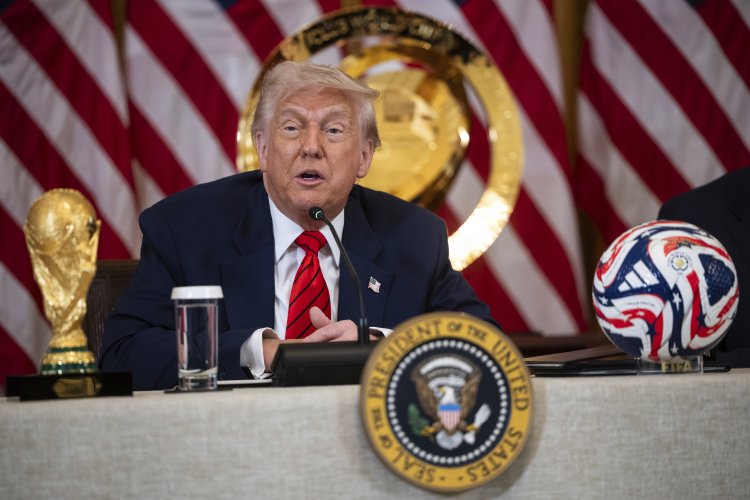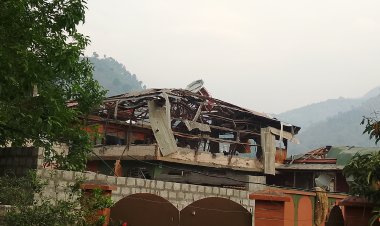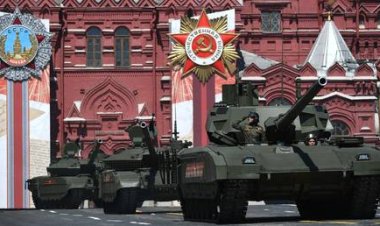Trump intensifies preparations for 2026 World Cup despite tensions with neighbors: ‘Tensions are a good thing’
Andrew Giuliani, the newly appointed head of the FIFA task force, had a meeting with executives from the host city and officials from the Department of Homeland Security on Wednesday.

Trump is intensifying preparations to co-host the 2026 World Cup next summer — a month-long celebration of international camaraderie — in partnership with Canada and Mexico. The initial months of his second term have seen new tariffs imposed on both neighboring countries, persistent jibes about transforming Canada into the 51st state, and a stringent approach to immigration, raising concerns about how the Trump administration will accommodate the millions of fans flocking to the U.S. to support their teams.
Not to worry, Trump remarked this week when queried about the tense relations during a FIFA task force meeting at the White House on Tuesday. “Tensions are a good thing,” Trump said. “It’ll make it more exciting.”
The U.S. portion of the 2026 tournament will span 11 cities and host over half of the event’s anticipated 104 matches, presenting a logistical challenge that FIFA President Gianni Infantino and Trump have likened to “three Super Bowls a day for a month.” Officials have begun strategizing for the influx of international visitors but caution that they must leave the country after the tournament concludes.
FIFA, soccer's international governing body, granted hosting rights to the three North American nations in 2018 during Trump’s first term. Planning for the event continued discreetly during the Biden administration, but a notable shift occurred this week with the inception of Trump’s newly established World Cup task force and enhanced collaboration among federal agencies, host cities, and FIFA. These early initiatives underscore the considerable undertaking facing the Trump administration as it works with officials across the U.S. and beyond to prepare for the 2026 games.
The administration’s planning draws inspiration from some of Trump’s familial business ventures, featuring roles for the son of former New York Mayor Rudy Giuliani and the brother of Defense Secretary Pete Hegseth.
Just a day after Trump tapped Andrew Giuliani, the former mayor’s son and a one-time gubernatorial candidate in New York, to lead his FIFA task force, Giuliani met with senior Homeland Security officials and around 10 executives from host cities at DHS, according to sources familiar with the meeting. “The president made it very clear to get to work,” a White House official, who requested anonymity to discuss internal matters, stated. “The task force is engaging with interagency partners and external stakeholders, including representatives from host cities, to deliver on the most successful sporting event in history.”
Phil Hegseth, sibling of Defense Secretary Pete Hegseth and currently serving as a senior adviser to the DHS secretary, along with Coast Guard Commandant Admiral Kevin Lunday were also present at the meeting, as noted by one of the sources.
Within the White House, deputy chief of staff Nick Luna has been assigned as the primary liaison for FIFA. He is also coordinating preparations for other significant projects, including America’s 250th birthday and the 2028 Olympics, events Trump views as critical to shaping his presidential legacy.
FIFA conducted a workshop this week with foreign embassies in Washington, where representatives from FIFA and U.S. officials from DHS and the State Department discussed security and accreditation processes, as part of a larger strategy to collaborate with consular offices before what is expected to be a surge in visa applications. Managing the admission of millions of international spectators — many of whom will be traveling between the U.S., Canada, and Mexico to support their teams — presents a significant challenge leading up to the tournament.
“We want them to come, we want them to celebrate, we want them to watch the game,” Vice President JD Vance stated during the task force meeting. “But when the time is up, they’ll have to go home. Otherwise, they’ll have to talk to Secretary Noem.”
Hosting large-scale international events also entails the added complexity of accommodating hundreds of thousands of fans. Soccer enthusiasts are often viewed as particularly problematic due to a history of hooliganism and a penchant for heavy drinking prior to matches.
During the 2021 European football championships, throngs of ticketless fans surged into Wembley Stadium. The 2019 UEFA Nations League finals in Porto witnessed clashes between English fans and riot police after incidents of vandalism. In multiple French host cities during the 2016 UEFA European Championship, Russian hooligans instigated violent confrontations, and in 2014, irate Brazilian fans breached a World Cup training facility to confront players.
“Through this Task Force, we will partner with law enforcement to give the tools necessary to ensure the safety of fans and cities during the games while showcasing American greatness on the world stage,” DHS Secretary Kristi Noem said in a statement.
Host city officials have requested $625 million from Congress for security expenses, a proposal that has been included in the House Homeland Security Committee’s budget reconciliation recommendations, which advanced through the Committee last week.
Federal officials plan to establish incident command centers in each of the 11 U.S. host cities — Atlanta, Boston, Dallas, Houston, Kansas City, Los Angeles, Miami, New York City and northern New Jersey, Philadelphia, San Francisco Bay Area, and Seattle — to coordinate across federal agencies, local law enforcement, and international allies.
Regardless of their political affiliation, many administration and local officials seem eager to utilize the 2026 World Cup to demonstrate global leadership and showcase their cities' offerings.
“We’ve all hosted Super Bowls, with football being America’s sport. But soccer is the world's sport and bringing the world here to play the world's game is a very unique opportunity for us,” expressed Alex Lasry, CEO of the New York-New Jersey 2026 World Cup Host Committee and a former Democratic Senate candidate in Wisconsin.
In Seattle, the World Cup has catalyzed deadlines for completing projects like a new waterfront park and substantial renovations at the Seattle-Tacoma International Airport. Meanwhile, planners in Kansas City are working diligently to develop transport options to connect fans from the city’s downtown to Arrowhead Stadium in the suburbs.
Daniel Lippman contributed reporting.
Frederick R Cook for TROIB News












